D by the Russian Institute for Demography, Migration and Regional Development in association with the Development Movement, an interregional public organization
| Вид материала | Документы |
- East-West Development Group, Russia ("ewdr") is a Russian wing of East-West Development, 75.73kb.
- Центр развития регионов center of regional development, 164.64kb.
- Авторская программа управление коллективом завельский Алексей Александрович Разволгина, 58.51kb.
- In Soviet times many mono-towns played an important role in social economic development, 95.34kb.
- Бюрократия и олигархия в историко-политической перспективе, 467.45kb.
- Public Organization «moscow entrepreneurs’ association», 79.39kb.
- Integrated development environment, 103.33kb.
- Семинара Тема доклада, 26.24kb.
- Семинара Тема доклада, 24.57kb.
- Восточно-Европейский Гештальт Институт (веги), 257.46kb.
Institute for Demography, Migration and Regional Development
Development Movement (interregional public organization)
THE PATH
TO PEACE AND CONCORD
IN AFGHANISTAN
will be determined by the position Russia takes
An Analytical and Programmatic Report

Moscow
2008
The present report, The Path to Peace and Concord in Afghanistan Will Be Determined by the Position Russia Takes, has been prepared by the Russian Institute for Demography, Migration and Regional Development in association with the Development Movement, an interregional public organization. The main goal of this report is to propose theses for discussion in order to elaborate a new policy on Afghanistan for Russia.
This report incorporates the results of discussions with Russian and Afghan experts, representing different opinions on the situation in Afghanistan. It is also based on data obtained from Afghan, Russian and foreign experts, the Regional Studies Center of Afghanistan (Kabul), analytical surveys done by the Modern Afghanistan Studies Center (Moscow), as well as the publications of Russian and foreign nongovernmental organizations and mass media.
Members of the research team:
Yuri Krupnov (project leader), Ilnur Batyrshin, Andranik Derenikyan, Boris Krupnov and Serafim Melentiev
© Institute for Demography, Migration
and Regional Development, 2008
CONTENTS
The problem of Afghanistan for Russia and the world 4
Viewpoints in Russian society regarding solution
of the "Afghanistan problem" 6
A united independent Afghanistan 10
Afghan national reconciliation 11
What are the taliban? 12
The USA and NATO factor 14
Novy Sredny Vostok 21
A comprehensive Afghanistan development plan 26
Exporting development 28
Afghanistan development projects 29
Cooperation with neighbors for development 32
The SCO factor 34
Russian–Pashtun dialogue 34
An agenda for top–level cooperation between Russia and Afghanistan 36
Conclusion 37
The Problem of Afghanistan for Russia and the world
The ongoing civil war in Afghanistan and the essential inability or unwillingness of a number of foreign states and their military contingents to bring peace and concord to the people of Afghanistan are the source of fundamental challenges, threats and aggression for Russia and other countries, namely:
– the drug threat and drug aggression, as a result of which the majority of Russian drug addicts are taking Afghan opiates and heroin, while the overall number of people addicted to these most dangerous drugs is steadily increasing; furthermore, over the past five years we have observed a drastic growth in the export of cannabis group drugs from Afghanistan to Russia;
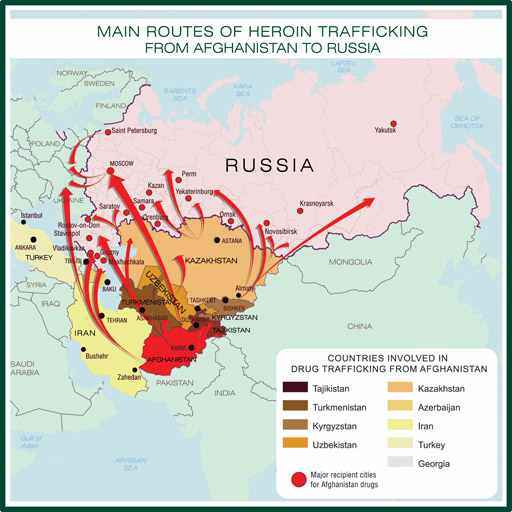
– the threat from transnational criminal groups, closely connected to the drug business and drug trafficking from Afghanistan to Russia via the Middle (Central) Asian republics, gaining strength in Middle (Central) Asia;
– the threat from the presence of U.S. and NATO armed forces in Afghanistan and its neighbors in the form of a network of "military super–bases."
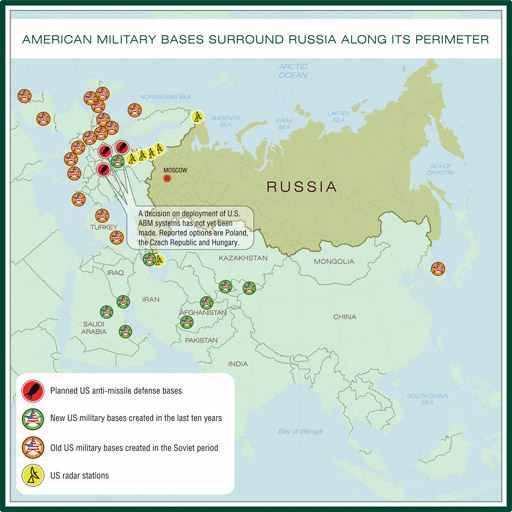
In general, due to the ongoing military actions and foreign interference in its affairs, Afghanistan has become a source of growing threats and aggression which affect the Russian Federation directly, as well as through the Middle Asian states, and increase general instability, undermining Russia's overall capacities and strength.
At the same time, Russia at present does not possess proven methods and technologies to protect the country from the threats and aggression mentioned above. This has to do with the fundamentally new situation existing in Afghanistan, in which routine economic and military approaches and solutions are destined to be ineffective.
Analysis shows that only realistic way of eliminating the above–mentioned threats and aggression is the intensified development of the state in Afghanistan, transforming this country into a strong and self–sufficient nation. This challenge, in turn, requires the elaboration and implementation of totally new approaches, which will be comprehensive and relevant in the humanitarian, political–anthropological and socio–economic spheres, contributing to building a strong and prosperous Afghan state.
There need to be new approaches and development methods, which in their totality would allow Afghanistan to gain its independence, build up and strengthen its statehood, carry out an intensified transition from a ruined society and economy with an expanding drug business, accounting for over half of the country's GDP, to a prosperous, stable and consolidated society, ensuring a worthy life for every single Afghan citizen and ethnic group.
Viewpoints in Russian society regarding
solution of the "Afghanistan problem"
The issue of Afghanistan is very difficult and painful for Russia.
Russian society is still suffering from the "Afghan syndrome" — a result of the Soviet Armed Forces' tragic involvement in military actions in Afghanistan from December 1979 to February 1989 on the side of Afghanistan's government.
During the years of severe crisis and subsequent collapse of the USSR, this 10–year period was judged mainly in a negative and often insulting way. Such views stemmed from the emerging ideology of Russian federal state nationalism, which may be called rossiysky nationalism (different from traditional Russian ethnic, or russky nationalism.). As early as the 1980s, supporters of this concept promoted the idea that the borders of the Russian Soviet Federative Socialist Republic (RSFSR) would be optimal for a new Russian state. They viewed Russia's having a presence even in Middle Asia, never mind Afghanistan which is further abroad, as unnecessary and harmful to Russia's national interests.
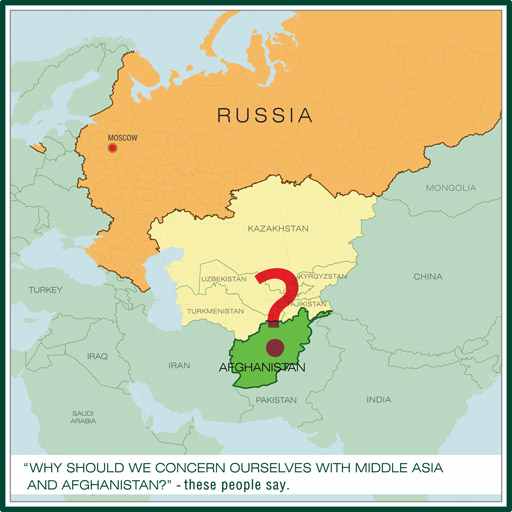
Today, this rossiysky nationalism remains the leading ideology of the majority of Russia's establishment. It is a kind of a doctrinal mainstream. However, its fundamental inefficiency for maintaining Russia's existence and place in world history has become obvious.
This has been unambiguously illustrated not only by the collapse of the USSR, which became "the biggest geopolitical catastrophe of the 20th century" (Vladimir Putin), but also by the CIS crisis, disquiet in the Caucasus, as revealed most vividly during the South Ossetia conflict of August 2008, and also by the swift advance of Georgia and Ukraine towards NATO membership and the transformation of historical Russia from a superpower into one of many regional powers.
Implementation of the doctrine of rossiysky nationalism over the recent twenty years has resulted in a deep tendency of provincialism in Russia today. Consequently, on the one hand, the country found itself incorporated into the global political and economic systems, and became painfully dependent on them, as illustrated by the impact of the global financial crisis and other foreign–generated negative trends. On the other hand, it is only in the recent several years that Russia has made some first attempts at taking part in governing world processes.
One of the clearest and most illustrative examples of such provincialism is the Russian elites' disregard for the problems of Afghanistan, which they see as a "remote" country. Geography notwithstanding, however, Afghanistan has once again been drawing "closer" to the Russian Federation during the last 10 years.
The solution of the Afghanistan problem is becoming one of the key issues on the Russian foreign policy agenda.
On the one side, the last seven years have shown that it was unjustified to count on the efficacy of the Bonn process (implementation of the decisions of the December 2001 UN conference on Afghanistan, held in Bonn) and the presence of foreign troops and International Security Assistance Forces (ISAF) in Afghanistan. On the other side, neither Russia, nor any other developed country, nor the world community as a whole has a clear strategy and proven methods for rapid reconstruction and strengthening of this shattered state, gripped as it is by military conflicts and a flourishing shadow economy and drug business, which destabilize the situation in the whole region.
Thus, the problem of Afghanistan presents a direct challenge for Russian international and socioeconomic policy. It demands the generation of effective policy decisions of worldwide significance, for which the political ideology of an egoistical "national state" and the "free–market" economic ideology, adopted and implemented in Russia and the CIS countries since the 1980s, are of little value.
In this situation, it is of extraordinary importance to reveal and formulate the main viewpoints and approaches that Russian elites and society have towards Afghanistan.
There are currently three different and irreconcilable viewpoints concerning the "Afghanistan problem."
1st viewpoint: Non–interference
This viewpoint comes down to the idea that Russia's Afghanistan policy should rest on non–interference in Afghan affairs and be confined to individual humanitarian acts and small, cost–effective projects of symbolical significance. Therefore, Russia should continue to approve the presence of U.S., NATO and international coalition armed forces in Afghanistan, and support the so–called War on Terror of the USA and its allies.
2nd viewpoint: Realpolitik
The main idea of this position is that Russia is unable to influence the general situation in Afghanistan. Moreover, the level of ethnic confrontation in Afghanistan today has reached such a high point that there is almost no way to preserve this country as a united state. Therefore it is necessary to concentrate on establishing close ties with the northern provinces of Afghanistan and to create a buffer zone in that area. In case Afghanistan's government becomes weaker, Russia should advocate partition of the country into two new countries, one in the north and one in the south, with the border running along the dividing line between areas in which particular ethnic communities make up the majority of the population.
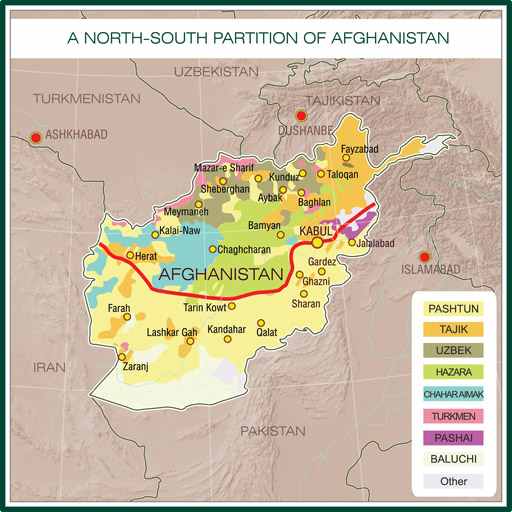
3rd viewpoint: Creation of a strong, united and independent Afghan state
The supporters of this opinion claim that Russia has a vital interest in a strong Afghan state within its contemporary borders, with the problem of recognition of the Durand Line as Afghanistan's state border being deferred into the indefinite future. Only a strong, united Afghan state can wipe out the drug economy and terrorism, thus destroying the conditions favorable for the activities of transnational criminal groups, and preventing foreign military bases from operating on its territory. Only a strong and independent Afghanistan can ensure peace for itself and its neighbors.
As one expert put it, "Afghanistan is the heart of the Central East." If you tear the heart in two, the whole organism dies."
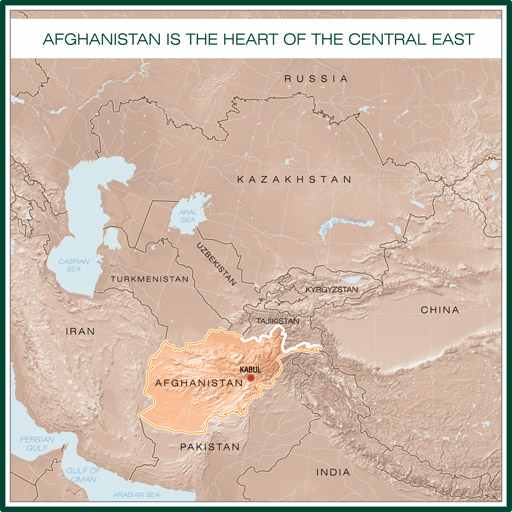
A united independent Afghanistan
These three viewpoints define a serious split within the Russian political and expert community, preventing Russia from elaborating and implementing a single Afghan policy. Instead, we see only partial reactions and separate, uncoordinated, sometimes completely inappropriate measures.
Analysis shows that the only possible approach for Russia is to promote the creation of a united, independent and strong Afghan state. This is the only approach which will solve the "Afghan problem" and restore Russia as mirovaya derzhava (world power), i.e., a nation whose statehood is strong enough for it to be capable of solving world problems by organizing cooperative development — the со–development of Russia and other countries taking part in the solution of world problems.
The currently popular strategy of Russian non–interference in Afghan affairs actually encourages U.S. and NATO attempts to establish a military springboard and bridgehead in the very heart of Asia. At the same time, the past seven years have shown that the presence of foreign troops in Afghanistan, led by the United States and NATO, is fundamentally inadequate to the task of bringing peace to the region. The goal of this presence is directly the opposite — to maintain and bolster permanent instability and provoke never–ending military actions, to justify the presence itself and the increase in the number of military bases in the region.
The separation of the northern provinces will not solve the Afghanistan problem, either. Moreover, it would trigger the collapse of existing nation–states in the Central East and will bring new, great antagonisms and temptations to the post–Soviet Middle Asian states. The secession of the northern provinces would destabilize the situation there. Local authorities and law enforcement bodies would lose power, leading ultimately to a strengthening of transnational Tajik and Uzbek criminal networks and an increase of drug trafficking through those territories. The establishment of a "buffer zone" will not isolate Middle Asia from the instability of southern Afghanistan, as the supporters of the second opinion claim, but will lead to exactly the opposite result. With foreign countries' military forces actively engaged in the region, northern Afghanistan will soon be engulfed by riots and local conflicts, bringing the source of instability even closer to the borders of Middle Asia and Russia.
That is why the goal of creating a united and independent Afghanistan must become a point of doctrine for Russia, whereas the other two viewpoints appear erroneous in the circumstances which actually exist.
Afghan national reconciliation
The establishment of a unitеd, independent and strong state of Afghanistan requires interethnic, intertribal and inter–territorial peace and concord in Afghan society.
This is impossible without the involvement of all of the country's peoples (ethnic groups) and political forces, including those who are now in the opposition, in the negotiation process regarding the future of Afghanistan and the Central East as a whole.
The failure of the 2001 Bonn conference decisions and utter inefficacy of the foreign presence in Afghanistan, from October 2001 to the present day, clearly indicates the need to convene another International Conference on Peace and Prosperity for Afghanistan, under the aegis of the UN. This conference should be organized with due account of the mistakes made in the format and organization of the Bonn conference, and its main goal should be the discussion of the measures required for ensuring peace in Afghanistan and the country's further peaceful development.
It would be reasonable to hold such a conference in Afghanistan itself, for example in Kabul. Representatives of all the peoples (ethnic groups), tribes and provinces of the country, as well as delegates from all active political forces who are ready to take part in a constructive dialogue, including the opposition, should be invited.
The following actors must take part from Afghanistan's side:
– representatives of the Afghan government;
– representatives of the armed opposition;
– representatives of institutions of civil society;
– representatives of academic institutions;
– persons with nationwide and international authority.
The following actors must take part on the part of the international community:
– UN delegation,
– delegation of the Shanghai Cooperation Organization;
– delegations of the CIS and CSTO (Collective Security Treaty Organization);
– delegation of the Organization of the Islamic Conference;
– delegation of the Non–Aligned Movement;
– delegations of the Afghanistan's neighbor countries;
– delegations of those countries in the region which play a significant role in the affairs of Afghanistan, including a Russian delegation;
– ЕU delegation;
– NАТО delegation.
Participants in the conference must adopt a plan for restoring peace in Afghanistan and for its future development, determine the structure of Afghanistan's political system, and specify the time limits, conditions and goals of the presence of foreign troops in the country. It also makes sense to approve a Comprehensive Afghanistan Development Plan, which should be prepared by Russia and other interested countries in advance.
At the same time, a Loya Jirga (Grand Council of Afghanistan, serving as a legislative assembly) should be convened, to discuss the decisions made at the conference, and amend them as necessary, and then approve them.
Russia, as a country whose forces have not participated in the seven–year war in Afghanistan, can act as mediator between the opposing sides in the conflict.
It would also be reasonable for Russia to initiate the Afghanistan Peace and Prosperity Conference and submit this proposal to the UN.
What are the taliban?
It is impossible to achieve lasting peace in Afghanistan without solving the "Taliban problem". That is why we need to clarify what the taliban are, and how it is possible to engage them in the peace dialogue.
At present the following wrong ideas, mistaken beliefs and misconceptions about the taliban are common.
The first one is that the taliban (plural of "talib," meaning "student") form some kind of well–organized group coordinated from a single center, whose leader is Mullah Omar.
The second one is that the taliban support Al–Qaeda and are extremists and terrorists, responsible for terrorist attacks organized by Al–Qaeda.
The third misjudgment considers all Pashtuns to be taliban and declares them to be supporters of Al–Qaeda and terrorists.
In reality, the taliban movement consists of a large number of dispersed groups with different goals, with only weak and sporadic coordination of their joint activity.
Today the taliban may be divided into three groups:
1) "The black taliban" are international mercenaries (Arabs and representatives of other nationalities), who came to Afghanistan from other countries. These people are not Afghan citizens, and they are fighting there for money. Their masters pay them to constantly fuel the war in southern Afghanistan and deliberately destabilize the situation inside the country. Terrorist attacks are mainly carried out by these groups, which have nothing to do with the peoples of Afghanistan.
2) "The grey taliban" are people living in Afghanistan, who have become professional soldiers and have almost completely abandoned peaceful labor. However, they have nothing to do with international terrorism, not to mention Al–Qaeda. The "grey taliban" wage war because there has been no peace in Afghanistan throughout the last 30 years, the territory of the country is occupied by foreign troops, and all conditions have been created for waging warfare.
3) The "white taliban" are people who are occasionally forced to participate in military actions, because the national economy is in ruins, and they have no other way to support their families. They do not consider themselves to be taliban. The "white taliban" form the majority of the armed opposition, and they would prefer a peaceful way of life, provided there were jobs and the necessary conditions for a decent life.
In order to establish peace in Afghanistan, it is necessary to neutralize the "black taliban," put an end to the subversive and terrorist activities of the secret services of a number of countries, including neighboring ones, and create the economic and political conditions for a peaceful life, which will allow the "grey" and "white" taliban to stop fighting.
It should be taken into consideration that, by the time the U.S. and NATO military operation in Afghanistan began in October 2001, a special concept of "the Taliban," based on logical manipulations, had been manufactured. Its main point was to make people see the Pashtuns, the taliban and international terrorists as all the same.
This notion allowed, and still allows, the USA and NATO to count as "terrorists" almost all the opposition forces which are fighting against the official Afghan government and the U.S. and NATO troops stationed on Afghan territory, which are in effect an occupation force vis a vis the Afghan population, especially for the Pashtuns.
The word "talib" was turned into a synonym of "terrorist" thus providing what became the principal excuse for foreign troops to stay in Afghanistan. According to this excuse, "It is the Taliban who are fighting against us in Afghanistan; the Taliban are terrorists, and we are fighting terrorism all over the world; that is why our troops are in Afghanistan."
Through the exploitation of this notion, nearly all Pashtuns have come to be perceived as terrorists, though this is the most numerous ethnic group in Afghanistan, comprising the backbone of its statehood. The antiterrorist operation has been transformed into a war against half the country's population.
At the same time, the USA and NATO have no other option for the next year or two, than to begin negotiations with the taliban and other opposition forces. Thus, it could well turn out, that while Russian officials continue mechanically to excoriate "the Taliban" and "terrorists," the USA and other NATO countries will reach the agreements they seek with the so–called "Taliban."
